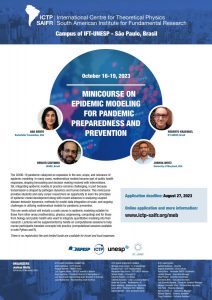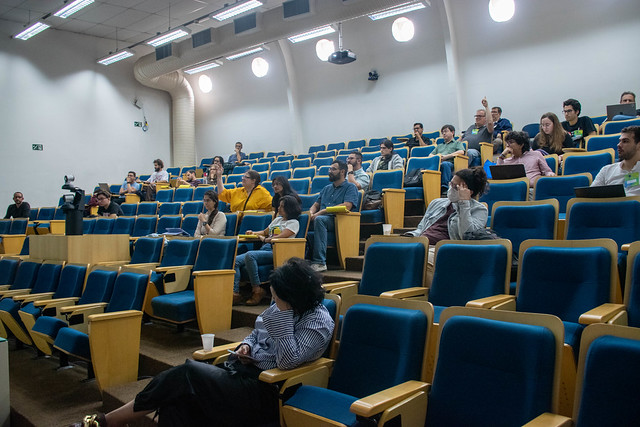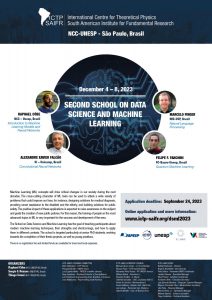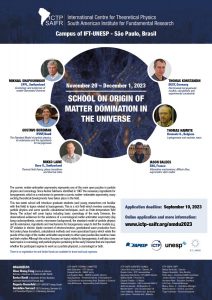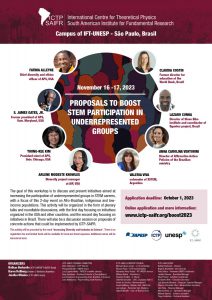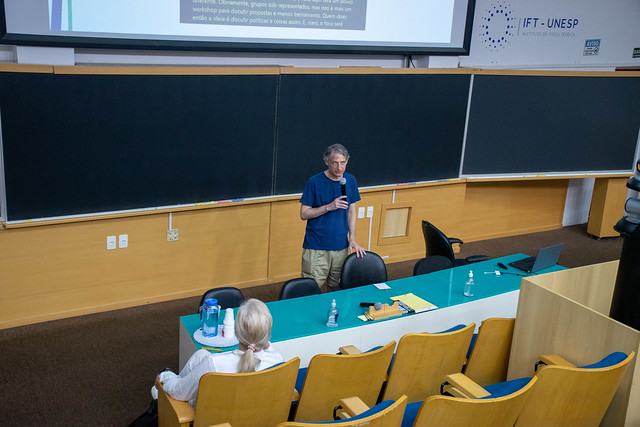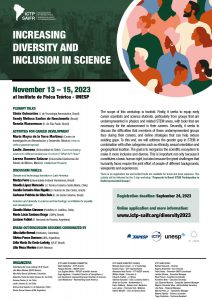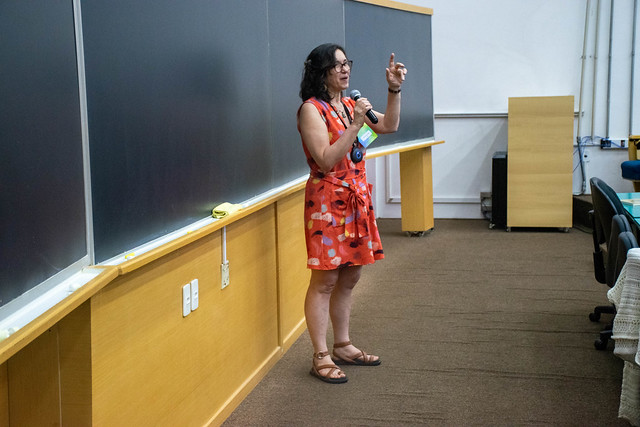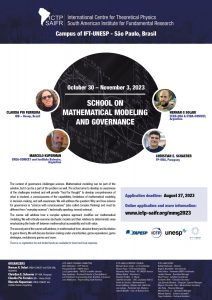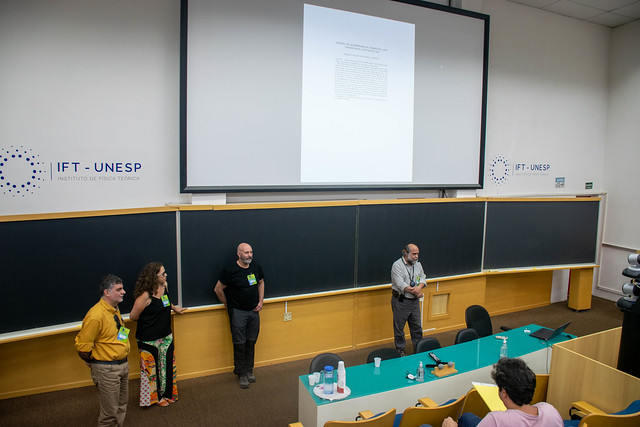Search Results
Minicourse on Epidemic Modeling for Pandemic Preparedness and Prevention
October 16-19, 2023
São Paulo, Brazil
ICTP-SAIFR/IFT-UNESP

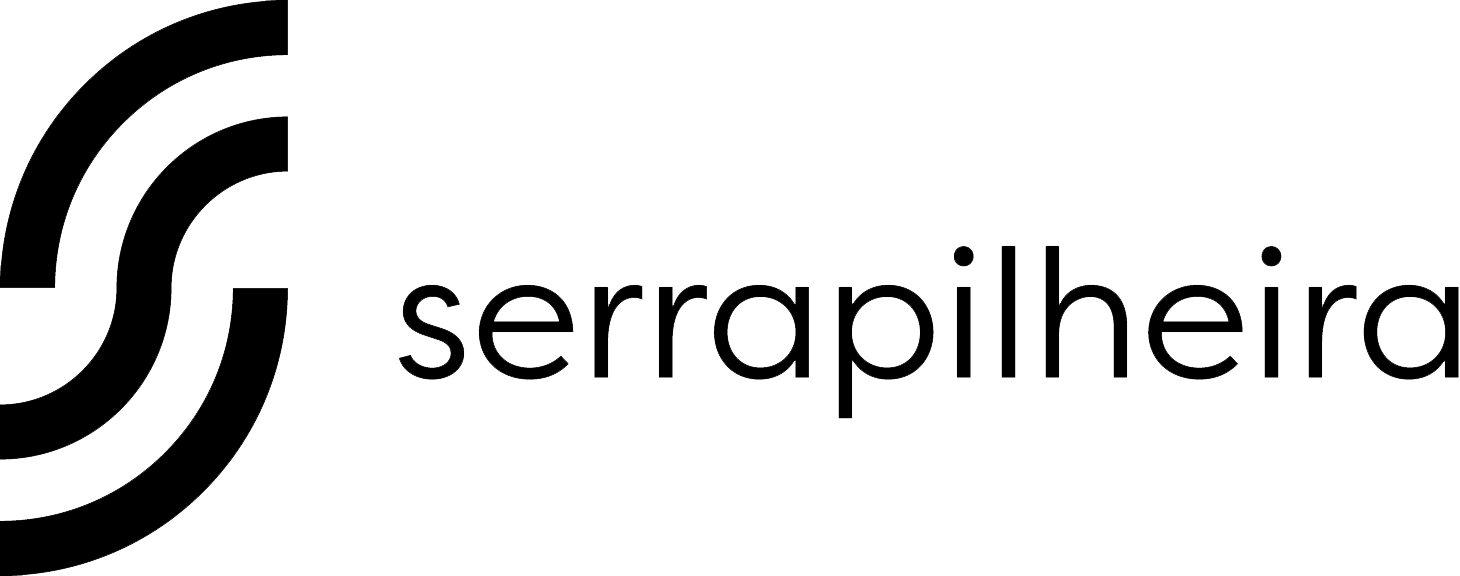
Home
The COVID-19 pandemic catalyzed an expansion in the size, scope, and relevance of epidemic modeling. In many cases, mathematical models became part of public health responses, shaping forecasting and decision making involved with interventions. Yet, integrating epidemic models in practice remains challenging, in part because transmission is shaped by pathogen dynamics and human behavior. This minicourse provides students and early career researchers an opportunity to learn the principles of epidemic model development along with recent advances in analyzing coupled disease-behavior dynamics, methods for model-data integration at scale, and ongoing challenges in utilizing mathematical models for pandemic prevention.
This one week school will include a crash course in epidemic modeling suitable for those from other areas (mathematics, physics, engineering, computing) and for those from biology and public health who want to integrate quantitative modeling into their research. Lectures will be supplemented by hands-on computational sessions to help course participants translate concepts into practice (computational sessions available in both Python and R).
There is no registration fee and limited funds are available for travel and local expenses.
Organizer:
- Joshua Weitz (University of Maryland, USA)
List of participants: Updated on November 16, 2023
Satisfaction Survey: HERE
Lecturers
Lecturers:
- Ana Bento (Rockefeller Foundation, USA) – Balancing disease and economic outcomes; and surveillance, information seeking, and preventing future pandemics.
- Renato Coutinho (UFABC, Brazil) – Transmissibility and reinfection of variants; and Modeling the impact of vaccination campaigns.
- Roberto Kraenkel (IFT-UNESP, Brazil) – Crash-course for epidemics; and Modeling an ongoing epidemic.
- Joshua Weitz (University of Maryland, USA) – Epidemic dynamics through the lens of COVID-19; Heterogeneity and its consequences; and Hands-On Modeling.
Registration
Program
Videos and Files
-
14:00 - Joshua Weitz (University of Maryland, USA):
Epidemic dynamics through the lens of COVID-19
-
16:00 - Roberto Kraenkel (IFT-UNESP, Brazil):
Crash-course for epidemics
-
10:30 - Renato Coutinho (UFABC, Brazil):
Transmissibility and reinfection of variants
-
14:00 - Ana Bento (Rockefeller Foundation, USA):
Balancing disease and economic outcomes
-
16:00 - Joshua Weitz (University of Maryland, USA):
Hands-On Modeling; Epidemic Basics
-
10:30 - Joshua S. Weitz (University of Maryland):
Model-driven Tools for Pandemic: Response & Prevention
- 14:00 - Joshua S. Weitz (University of Maryland): Ecological Dynamics and Therapeutic Impacts of Bacteriophage: a Not-So-Perfect Predator
-
16:00 - Joshua Weitz (University of Maryland, USA):
Hands-On Modeling; Stochastic Epidemics
-
10:30 - Joshua Weitz (University of Maryland, USA):
Heterogeneity and its consequences
-
14:00 - Roberto Kraenkel (IFT-UNESP, Brazil):
Modeling an ongoing epidemic
-
16:00 - Ana Bento (Rockefeller Foundation, USA):
Surveillance, information seeking, and preventing future pandemics
asdasdasd
Photos
Additional Information
BOARDING PASS: All participants, whose travel has been provided or will be reimbursed by ICTP-SAIFR, should bring the boarding pass upon registration. The return boarding pass (PDF, if online check-in, scan or picture, if physical) should be sent to secretary@ictp-saifr.org by e-mail.
COVID-19: Brazilians and foreigners no longer have to present proof of vaccination before entering the country.
Visa information: Nationals from several countries in Latin America and Europe are exempt from tourist visa. Nationals from Australia, Canada and USA are exempt from tourist visa until January 10, 2024. Please check here which nationals need a tourist visa to enter Brazil.
Accommodation: Participants, whose accommodation will be provided by the institute, will stay at The Universe Flat. Hotel recommendations are available here.
How to reach the Institute: The school will be held at ICTP South American Institute, located at IFT-UNESP, which is across the street from a major bus and subway terminal (Terminal Barra Funda). The address which is closer to the entrance of the IFT-UNESP building is R. Jornalista Aloysio Biondi, 120 – Barra Funda, São Paulo. The easiest way to reach us is by subway or bus, please find instructions here.
Continue Reading |
Comments Off on
Alternative routes to IFT-UNESP
Alternative ways to get to ICTP-SAIFR at the IFT-UNESP building when the metro is on strike
- By subway+train (4,40 BRL): approximately 50 minutes
You can walk to the “Paulista Pernambucanas” metro station. (The yellow line is managed by a different company, so it will not be closed due to the strike.) It is a 20 min walk from the hotel. https://goo.gl/maps/MEaAEcDtLvtNh1SX6
From the “Paulista Pernambucanas” metro station you have to go to Luz station and then take the train CPTM line 7- Rubi to “Barra Funda” station. (They are integrated transportation systems, so you will not pay for another ticket. However, you should first confirm that the CPTM train is not also on strike.)
This is the link to the Google app route: https://goo.gl/maps/MEaAEcDtLvtNh1SX6
- By Bus (4,40 BRL cash only on the bus): approximately 50 minutes
You will have to walk approximately 5 minutes until the bus stop located at Av. Paulista 1374 and take either the “875P-10 – Metrô Barra Funda” bus and get off at the final stop, or take the “175P-10 – Metrô Santana” bus and get off at the Metrô Barra Funda stop.
This is the link to the Google app route “875P-10 – Metrô Barra Funda” https://goo.gl/maps/Z8Quoogtair6Vxj49
This is the link to the Google app route “175P-10 – Metrô Santana” https://goo.gl/maps/wSrBdx1vAttg6JeL8
Note that this route may take longer depending on traffic.
- By Uber (30 – 40 BRL, the fare may vary due to the strike): approximately 30 minutes
You just have to type that you are going to “IFT-Instituto de Física Teórica – IFT- UNESP” or “UNESP – Barra Funda”
This is the link to the Google Maps location: https://goo.gl/maps/Vbvz8o8BKPvYi3zw8
Continue Reading | Comments Off on Alternative routes to IFT-UNESP
Colloquium by Juan Maldacena on Hawking Radiation

Speaker: Juan Maldacena (Institute for Advanced Study)
Title: The entropy of Hawking radiation
Abstract: Black holes are fascinating spacetime configurations predicted by general relativity. When quantum mechanics is taken into account, black holes are found to emit thermal radiation, called “Hawking radiation”. Recently an interesting area formula for the quantum entropy of black holes was derived. This also leads to a surprising new way to compute the entropy of Hawking radiation. This result indicates that the black hole formation and evaporation is consistent with standard quantum mechanical laws.
Time: Wednesday, June 14, 2 pm
Live stream on YouTube:
Poster:
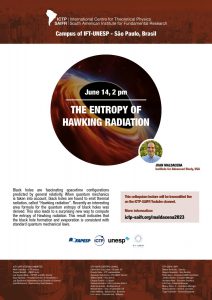
Continue Reading | Comments Off on Colloquium by Juan Maldacena on Hawking Radiation
Second School on Data Science and Machine Learning
December 4 – 8, 2023
São Paulo, Brazil
NCC-UNESP

Home
Machine Learning (ML) concepts will drive critical changes in our society during the next decades. The cross-cutting character of ML tools can be used to attack a wide variety of problems that could improve our lives, for instance, designing solutions for medical diagnosis, providing smart assistance to the disabled and the elderly, and building solutions for public safety. The positive impact of these applications is expected to raise awareness on the subject and guide the creation of new public policies. For this reason, the training of people on the most advanced topics in ML is very important for the success and development of the area.
The School on Data Science and Machine Learning has the goal of teaching participants about modern machine learning techniques, their strengths and shortcomings, and how to apply them in different contexts. The school is targeted particularly at senior PhD students, working towards the completion of their thesis projects, as well as young postdocs.
The school participants will learn the formalism of machine learning, starting from an introductory level and going through more advanced topics like computer vision, sequential and recursive learning, anomaly and outlier detectors, and generative models. The theoretical lectures will be mixed with a set of hands-on sessions where participants will be able to apply the concepts to solving real-world problems.
There is no registration fee and limited funds are available for travel and local expenses.
Topics:
- Introduction to Machine Learning
- Neural Networks
- Convolutional Neural Networks
- Generative Models
- Reinforcement Learning
- Natural Language Processing
Organizers:
- Raphael Cobe (NCC-UNESP/AI2, Brazil)
- Sergio F. Novaes (UNESP/AI2, Brazil)
- Thiago Tomei (NCC-UNESP/AI2, Brazil)
List of participants: Updated on December 07, 2023.
Survey: Here
Lecturers
Lecturers:
- Raphael Mendes de Oliveira Cóbe (NCC – Unesp, Brazil): Introduction to Machine Learning Models and Neural Networks
- Alexandre Xavier Falcão (IC – Unicamp, Brazil): Convolutional Neural Networks
- Luciano Oliveira (UFBA, Brazil): Generative Models
- Marcelo Finger (IME-USP, Brazil): Natural Language Processing
- Felipe Fernandes Fanchini (FC-Bauru-Unesp, Brazil): Quantum Machine Learning
Registration
Program
Download PDF version: HERE
Flash Talks
December 7, 2023
- Flora Medeiros Sauerbronn (Federal University of Santa Catarina): Saving dolphins through AI: Creating a tool for IBAMA audits
- Luciana Erika Yaginuma (Instituto Oceanográfico of Universidade de São Paulolu): Using machine learning techniques to predict benthic communties spatial distribution
- Sarah Peixoto Rodrigues Freire (Ilum School of Science- Brazilian Center for Research in Energy and Materials(CNPEM)): Inverse Project of New Bioactive Glasses
- Luiz Felipe Demétrio (Universidade Estadual de Londrina): The Era of Precision Cosmology: probing the Primordial Universe
- Romana Petry (Universidade Federal do ABC): When theoretical physics meets material science and environmental nanotoxicology
- Adriana Canedo Miranda (PUCRS ): Large-scale proteogenomics characterization of the M. tuberculosis hidden proteome
- Raul de Palma Aristides (IFT – UNESP): Inferring the connectivity of networks with Kalman Filter
- Denise Cammarota (IFT UNESP): Data in Epidemic Modeling
- Thales Fernandes (Butantan Institute): Protein Structure Modelling with Deep Learning
- André Martinez (Unicamp): Connectivity of Atlantic Forest fragments through seed dispersal
- Ignacio Alcántara (Biostatistics Unit, Public Health Department, Universidad de la Republica): Developing Metrics for Comparing the Epidemiology of Veterinary Drug Use in Cattle Parasite Control: An Application of the ATCvet System in One Health
Format: 4 min talk with slide presentation
Videos and Files
- 09:30 - Raphael Mendes de Oliveira Cóbe (NCC – Unesp, Brazil): Introduction to Machine Learning Models and Neural Networks - Class 1
- 11:30 - Raphael Mendes de Oliveira Cóbe (NCC – Unesp, Brazil): Introduction to Machine Learning Models and Neural Networks - Class 2
- 14:30 - Raphael Mendes de Oliveira Cóbe (NCC – Unesp, Brazil): Introduction to Machine Learning Models and Neural Networks - Class 3
- 16:30 - Raphael Mendes de Oliveira Cóbe (NCC – Unesp, Brazil): Introduction to Machine Learning Models and Neural Networks - Class 4
- 09:30 - Alexandre Xavier Falcão (IC – Unicamp, Brazil): Convolutional Neural Networks - Class 1
- 11:30 - Alexandre Xavier Falcão (IC – Unicamp, Brazil): Convolutional Neural Networks - Class 2
- 14:30 - Alexandre Xavier Falcão (IC – Unicamp, Brazil): Convolutional Neural Networks - Class 3
- 16:30 - Alexandre Xavier Falcão (IC – Unicamp, Brazil): Convolutional Neural Networks - Class 4
- 09:30 - Luciano Oliveira (UFBA, Brazil): Generative Models - Class 1
- 11:30 - Luciano Oliveira (UFBA, Brazil): Generative Models - Class 2
- 14:30 - Luciano Oliveira (UFBA, Brazil): Generative Models - Class 3
- 16:30 - Luciano Oliveira (UFBA, Brazil): Generative Models - Class 4
- 09:30 - Marcelo Finger (IME-USP, Brazil): Natural Language Processing - Class 1
- 11:30 - Marcelo Finger (IME-USP, Brazil): Natural Language Processing - Class 2
- 14:30 - Marcelo Finger (IME-USP, Brazil): Natural Language Processing - Class 4
- 16:30 - Marcelo Finger (IME-USP, Brazil): Natural Language Processing - Class 4
-
09:30 - Felipe Fernandes Fanchini (FC-Bauru-Unesp, Brazil):
Quantum Machine Learning - Class 1
-
11:30 - Felipe Fernandes Fanchini (FC-Bauru-Unesp, Brazil):
Quantum Machine Learning - Class 2
-
14:30 - Felipe Fernandes Fanchini (FC-Bauru-Unesp, Brazil):
Quantum Machine Learning - Class 3
-
16:30 - Felipe Fernandes Fanchini (FC-Bauru-Unesp, Brazil):
Quantum Machine Learning - Class 4
asdasdasd
Photos
Additional Information
BOARDING PASS: All participants, whose travel has been provided or will be reimbursed by ICTP-SAIFR, should bring the boarding pass upon registration. The return boarding pass (PDF, if online check-in, scan or picture, if physical) should be sent by e-mail to secretary@ictp-saifr.org
COVID-19: Brazilians and foreigners no longer have to present proof of vaccination before entering the country.
Visa information: Nationals from several countries in Latin America and Europe are exempt from tourist visa. Nationals from Australia, Canada and USA need a tourist visa starting from January 10, 2024. Please check here which nationals need a tourist visa to enter Brazil.
Accommodation: Participants, whose accommodation will be provided by the institute, will stay at The Universe Flat. Hotel recommendations are available here.
How to reach the Institute: The school will be held at ICTP South American Institute, located at IFT-UNESP, which is across the street from a major bus and subway terminal (Terminal Barra Funda). The address which is closer to the entrance of the IFT-UNESP building is R. Jornalista Aloysio Biondi, 120 – Barra Funda, São Paulo. The easiest way to reach us is by subway or bus, please find instructions here.
Poster presentation: Participants who are presenting a poster MUST BRING A PRINTED BANNER . The banner size should be at most 1 m (width) x 1,5 m (length). We do not accept A4 or A3 paper.
Continue Reading |
Comments Off on
2024 Activities
São Paulo International Schools on Theoretical Physics
School on Modeling Infectious Disease Dynamics
May 6-12, 2024
III Joint ICTP-SAIFR/ICTP-Trieste School on Particle Physics
June 24 – July 5, 2024
Second School on Dark Matter and Neutrino Detection
July 8-19, 2024
2024 Perimeter-SAIFR-IFT Journeys into Theoretical Physics
July 22-28, 2024
Cosmological History: from Gravitational Waves to Exoplanets
July 29 – August 9, 2024
School on Water: From the Anomalies to the Biological and Technological Applications
September 2-7, 2024
School on Active Matter
September 30 – October 4, 2024
Second Quantum Computing School
October 7 -18, 2024
ICTP-SAIFR/ExoHad School on Few-Body Physics
October 21 – 25, 2024
School on Biological Physics across Scales: Pattern Formation
November 11-22, 2024
Third School on Data Science and Machine Learning
December 2-6, 2024
Minicourses
The Holography of Solitons
March 4-7, 2024
Minicourse on Gravitational Wave Detectors and Sources
April 4-8, 2024
Minicourse on Quantum Computing
April 8-10, 2024
Minicourse on fluid-dynamical models of heavy ion collisions
April 15-16, 2024
Minicourse on Light from the Neutrinos
May 9-14, 2024 (Instituto Principia)
Minicourse on perturbative and nonperturbative treatment of quantum gravity problems
May 20-24, 2024
Minicourse on open quantum systems: fundamentals, collisional models, and path integrals
July 1-5, 2024 (Instituto Principia)
Minicourse on precision gravity: from the LHC to LISA and ET
August 13-22, 2024
Minicourse on Gravitational Wave Probes of the Early Universe
September 3-10, 2024
Minicourse on Bayesian Machine Learning for Scientific Research
October 28 – November 1, 2024
Minicourse on disorder and dynamics in strongly correlated materials
November 4-8, 2024
Meetings/Programs/Workshops
ICTP-SAIFR 12th Anniversary Symposium: Physics for South America
February 18-20, 2024
2024 ICTP-SAIFR Council Meeting
February 21, 2024
APS/SAIFR Satellite March Meeting
March 5, 2024
APS/SAIFR Satellite April Meeting
April 5, 2024
São Paulo Research Group Meetings in Astro & Cosmo
April – November, 2024 (Instituto Principia)
14th International Workshop on Neutrino-Nucleus Interactions (NUINT 2024)
April 15-20, 2024 (Instituto Principia)
Workshop on Dynamical Processes on Complex Networks
May 13-17, 2024
São Paulo Meeting on Soft and Biological Matter
May 17, 2024 (Instituto Principia)
Bootstrap meets Integrability
June 10-14, 2024 (Instituto Principia)
Integrability in Gauge and String Theory (IGST)
June 17-21, 2024 (Instituto Principia)
III LASF4RI for HECAP Symposium: Update of the Strategic Plan
August 26-29, 2024 (Instituto Principia)
V Siembra-HoLAGrav Young Frontiers Meeting (online external)
September 23 – 25, 2024
Witnessing Quantum Aspects of Gravity in a Lab
September 23 – 27, 2024 (Instituto Principia)
3rd Symposium on Current Topics in Molecular Biophysics (CTMB3)
October 7-9, 2024 (Instituto Principia)
Third Brazilian Meeting of Science Communicators
November 15-17, 2024 (Instituto Principia)
Program on “Fundamental Physics meets Current and Future Facilities in Cosmology”
December 2-13, 2024 (Instituto Principia)
Research Group Meetings on Quantum Technologies
December 3, 2024
Outreach
IV Escola de Verão ICTP-SAIFR para Jovens Físicos
January 15-20, 2024
IV Curso de Verão ICTP-SAIFR para Professores de Física de Ensino Médio
January 22-26, 2024
Ciência no Cinema
January – December, 2024
Clube do Livro Sci-SAIFR
February – December, 2024
ICTP-SAIFR Jogos de Física
March – November, 2024
Física Moderna para a Sala de Aula
March – November, 2024
Minicursos para Estudantes de Ensino Médio
March-December, 2024
Papos de Física
March – December, 2024
Ciclo de Palestras ICTP-SAIFR/Princípia: A Ciência do Cosmos, parte II
March, 2024
Módulos de Aulas para Estudantes de Ensino Médio
Abril-December, 2024
Preparação ICTP-SAIFR para Participação em Olimpíadas
Abril-December, 2024
Oficina ICTP-SAIFR para Jovens Físicos
June 22-23, 2024
Curso de Inverno ICTP-SAIFR para Jovens Físicos
July 8-12, 2024
ICTP-SAIFR Competition for Young Physicists
July 27, 2024
Continue Reading | Comments Off on 2024 Activities
Workshop on Machine Learning Methods for Materials
December 11-15, 2023
São Paulo, Brazil
ICTP-SAIFR/IFT-UNESP

Home
The school is aimed ate PhD students and junior postdocs, mostly from Latin America. Topics to be covered include:
1) General aspects of Machine Learning
2) High Throughput methods in Materials Science
3) Natural Language recognition and patterns
4) Neural Networks
5) Non-linear regression methods
6) Small Data methods (random forest, decision tree)
There is no registration fee and limited funds are available for travel and local expenses.
Organizers:
- Luiz Felipe C. Pereira (UFPE)
- Gustavo Martini Dalpian (UFABC)
- Alexandre Reily Rocha (IFT)
Speakers
- Luiz Felipe C. Pereira (UFPE, Brazil)
- Adalbarto Fazzio (ILUM, Brazil)
- Alexander Shapeev (Skolkovo Institute of Science and Technology, Russia)
- Amauri Jardim de Paula (Universidade Federal do Ceará, Brazil)
- Anatole von Lilienfeld (University of Vienna, Austria)
- Bohayra Mortazavi (Leibniz Universität Hannover, Germany)
- Dane Morgan (University of Wisconsin, USA)
- Davide Donadio (University of California Davis, USA)
- Edgar Dutra Zanotto (Universidade Federal de São Carlos, Brazil)
- Eric Pop (Stanford University, USA)
- Gabor Csanyi (University of Cambridge, UK)
- Gabriel Ravanhani Schleder (Harvard University, USA)
- Heather Kullik (MIT, USA)
- Juan Felipe Carrasquilla (Vector Institute, Canada)
- Juarez L. F. da Silva (Universidade de São Paulo, Brazil)
- Marivi Fernandez Serra (SUNY at Stonybrook, USA)
- Mark Tuckerman (New York University, USA)
- Miguel Alexandre Lopes Marques (Martin-Luther-Universität Halle-Wittenberg, Germany)
- Nicola Marzari (EPFL, Switzerland)
- Stefano Sanvito (Trinity College Dublin, Ireland)
- Ying Wai Li (Los Alamos National Laboratory, USA)
Registration
Preliminary Program
Additional Information
BOARDING PASS: All participants, whose travel has been provided or will be reimbursed by ICTP-SAIFR, should bring the boarding pass upon registration. The return boarding pass (PDF, if online check-in, scan or picture, if physical) should be sent to secretary@ictp-saifr.org by e-mail.
COVID-19: Fully vaccinated Brazilians and foreigners are required to present proof of vaccination, printed or electronically before boarding an international flight. Not vaccinated and not fully vaccinated passengers have to present a medical certificate with a negative test result before entering the country. Tests should be taken up to 24 hours before boarding.
Visa information: Nationals from several countries in Latin America and Europe are exempt from tourist visa. Nationals from Australia, Canada, Japan and USA are exempt from tourist visa until October 1st, 2023. Please check here which nationals need a tourist visa to enter Brazil.
Accommodation: Participants, whose accommodation will be provided by the institute, will stay at The Universe Flat. Hotel recommendations are available here.
How to reach the Institute: The school will be held at ICTP South American Institute, located at IFT-UNESP, which is across the street from a major bus and subway terminal (Terminal Barra Funda). The address which is closer to the entrance of the IFT-UNESP building is R. Jornalista Aloysio Biondi, 120 – Barra Funda, São Paulo. The easiest way to reach us is by subway or bus, please find instructions here.
Continue Reading |
Comments Off on
School on Origin of Matter Domination in the Universe
November 20 – December 1, 2023
São Paulo, Brazil
ICTP-SAIFR/IFT-UNESP

Home
The cosmic matter-antimatter asymmetry represents one of the main open puzzles in particle physics and cosmology. Since Andrei Sakharov identified in 1967 the necessary ingredients for baryogenesis, which is a mechanism to generate a cosmic matter-antimatter asymmetry, many exciting theoretical developments have taken place in the field.
This two-week school will introduce graduate students (and young researchers not familiar with this field) to topics related to baryogenesis. This is a rich field which involves cosmology, particle physics and some specific calculational techniques, such as finite-temperature field theory. The school will cover topics including basic cosmology of the early Universe, the observational evidences for the existence of a cosmological matter-antimatter asymmetry (big bang nucleosynthesis, cosmic microwave background), the standard model of particle physics and its extensions, ingredients and mechanisms for baryogenesis, ways to test the models (e.g. CP violation in electric dipole moment of electron/neutron, gravitational wave production from first order phase transition), calculational methods and more specialized topics which relate the puzzle of the origin of the matter-antimatter asymmetry to other open puzzles like neutrino mass and dark matter. Although the school focuses on topics related to baryogenesis, it will also cover basic topics in cosmology and particle physics pertaining to the early Universe that are important whether the participant aspires to work as a particle physicist, a cosmologist or both.
There is no registration fee and limited funds are available for travel and local expenses.
Organizers:
- Chee Sheng Fong (Centro de Ciências Naturais e Humanas, Universidade Federal do ABC, Brazil)
- Enrico Nardi (INFN, Laboratori Nazionali di Frascati, Italy & NICPB, Tallinn, Estonia)
- Rogerio Rosenfeld (ICTP-SAIFR/IFT-UNESP, Brazil)
- Géraldine Servant (DESY, Hamburg, Germany & II. Institute of Theoretical Physics, University of Hamburg, Germany)
List of Participants: Updated on November 27, 2023.
Survey: Here
Lectures
- Mikhail Shaposhnikov (EPFL, Switzerland): Cosmology and evidences of matter-dominated Universe
- Gustavo Burdman (IF-USP, Brazil): The Standard Model of particle physics, its extensions and the ingredients for baryogenesis
- Mikko Laine (Bern U., Switzerland): Thermal field theory, phase transitions and thermal rates
- Thomas Konstandin (DESY, Germany): Electroweak baryogenesis: models, calculations and experimental constraints
- Thomas Hambye (Brussels U., Belgium): Leptogenesis and neutrino mass
- Iason Baldes (ENS, France): Alternative mechanisms: Affleck-Dine, asymmetric dark matter
- Bhaskar Dutta (Texas A&M, USA): Origin of dark and visible matter
Registration
Program
Download the program: PDF updated November 27
Student Talks
Talk day 1
Nicolas Gomez Cruz (Universidad Nacional): Self-Interacting Dark Matter from a Leptophilic Particle Physics Model
Felipe Augusto da Silva Barbosa (Espirito Santo Federal University): Wigner doublets as dark matter candidates
Valentina Franco Velasquez (University of Antioquia): Dark Matter Production in Non-Standard Cosmologies
Caner Unal (Ben Gurion University): Bounds on Ultralight Particles via Superradiance, Line Intensity Mapping and Pulsar Timing Arrays
Dêivid Silva (Centro Brasileiro de Pesquisas Físicas): Using dark matter to alleviate the Hubble tension
Talk day 2
Lorenzo Diaz-Cruz (Benemérita Universidad Autónoma de Puebla): Probing new physics with Higgs couplings at LHC
Diego Portillo Sanchez (Centro de Investigacion y Estudios Avanzados del Instituto Politecnico Nacional): Majorana neutrino effects in $\Delta$L$=2$ hyperon decays
Mohamed Younes Sassi (Institute for Theoretical Physics Hamburg): CP and Charge violating Domain Walls in the 2HDM and their interactions with SM Fermions
AmirFarzan Esmaeili (Pontifical Catholic University of Rio de Janeiro): Neutrinos from Muon-rich ultra high energy electromagnetic cascade: The MUNHECA Code.
Talk day 3
Luiz Felipe Demétrio (Universidade Estadual de Londrina): Two fluid bouncing cosmology: quantum background and perturbations
DAVID ALEJANDRO SUAREZ ROLDAN (Universidad de Antioquia): Gauge Lepton Number And Dark Baryogenesis
Sergio Manuel Cubides Pérez (GIRG-UIS): Leptogenesis and EW sphalerons
Daniel Aguiar (UFMG): Relics of a Bubbling Universe – First Order Phase Transitions and Their Cosmological Implications
Poster Presentation
Poster day 1
- Ana Luisa Foguel (Instituto de Física, Universidade de São Paulo): (In)Visible signatures of the minimal dark abelian gauge sector
- Gonzalo Benitez (Universidad Tecnica Federico Santa Maria): Production of Mono-Higgs and Mono-Z in the Minimal Spin-one Isotriplet Dark Matter Model in pp Collisions
- Sebastian Acevedo (Univesidad ténica Federico Santa María): Sommerfeld Enhacement in fundamental and quintuplet representation of SU(2)_{L}
- KIMY JOHANA AGUDELO JARAMILLO (Institute of Physics – University of Antioquia): Anomaly-free Model with an extra Abelian gauge Dark Symmetry and Dirac Type II Seesaw
- Fernanda Lima Matos (Instituto de Física da USP): Study of Dark Matter relic abundance in dark photon models
Poster day 2
- Marcelo Klug (Universidade Estadual de Londrina): Bulk Viscosity Self-Interacting Dark Matter in Accelerated Expansion
- Maryam Bahrami Zanjani (Institute for Theoretical Particle Physics and Cosmology, RWTH Aachen University): Review of Hubble Tension Solutions with New SH0ES and SPT-3G data
- Caio Lima de Oliveira (Departamento de Física da Universidade Estadual de Londrina) : Building Cluster Weak Lensing Likelihoods with Kernel Density Estimation
- Ricardo Gonzatto Rodrigues (Universidade Estadual de Londrina): Testing the symmetries of the universe at sub-angular scales
- Pedro Bessa (UFES): Perturbations of Cosmological Redshift Drift
Poster day 3
- Emilse Cabrera Capera (UFCG): Search for sterile neutrino in the (3+2) scenario with IceCube data
- SILVIA LUCIA CORREA ANGEL (Universidade do Rio Grande do Norte): Updated Big Bang Nucleosynthesis Bounds on Long-lived Particles from Dark Sectors
- Vítor Pereira (Departamento de Física – Universidade Federal de Minas Gerais): First-order Phase Transition in Composite Higgs Models
- Thales Willian Cruz (Federal University of Itajubá): Birefringence in nonlinear electrodynamics and analog models
- William Araujo de Souza(Universidade Estadual de Londrina): Covariant Bardeen Perturbation Formalism
Poster day 4
- Ivan Perez (Cinvestav-IPN): Baryogenesis via Leptogenesis?
- Tammi Chowdhury (Carleton University): Leptogenesis Through Particle-Antiparticle Oscillations
- leandro fontes (IF-USP): Effective Type I seesaw and Leptogenesis
- Bruna Vallin Simão (Universidade Federal de Santa Catarina): Methods and Solutions of the Klein-Gordon Equation in Black Hole Spacetime Surrounded by Dark Energy
- Maria Clara Alvim Sousa (Universidade Federal de Minas Gerais): Cosmic Phases: exploring the early universe transitions
The posters will be displayed on the mezzanine level.
Participants who are presenting a poster MUST BRING A BANNER PRINTED. For details about the poster presentation, please, look at the correspondent Additional Information topic.
Videos and Files
-
09:15 - Mikhail Shaposhnikov (EPFL, Switzerland):
Cosmology and evidences of matter-dominated Universe - Class 1 of 4
- 11:15 - Gustavo Burdman (IF-USP, Brazil): The Standard Model of particle physics, its extensions and the ingredients for baryogenesis - Class 1 of 4
-
15:00 - Mikko Laine (Bern U., Switzerland):
Thermal field theory, phase transitions and thermal rates - Class 1 of 5
- 09:00 - Gustavo Burdman (IF-USP, Brazil): The Standard Model of particle physics, its extensions and the ingredients for baryogenesis - Class 2 of 4
-
11:00 - Mikhail Shaposhnikov (EPFL, Switzerland):
Cosmology and evidences of matter-dominated Universe - Class 2 of 4
-
15:00 - Mikko Laine (Bern U., Switzerland):
Thermal field theory, phase transitions and thermal rates - Class 2 of 5
-
09:00 - Mikhail Shaposhnikov (EPFL, Switzerland):
Cosmology and evidences of matter-dominated Universe - Class 3 of 4
-
11:00 - Mikko Laine (Bern U., Switzerland):
Thermal field theory, phase transitions and thermal rates - Class 3 of 5
- 14:00 - Mikhail Shaposhnikov (École Polytechnique Fédérale de Lausanne (EPFL)): Baryon asymmetry of the Universe: a window to physics beyond the standard model
- 15:30 - Gustavo Burdman (IF-USP, Brazil): The Standard Model of particle physics, its extensions and the ingredients for baryogenesis - Class 3 of 4
-
09:00 - Mikko Laine (Bern U., Switzerland):
Mikko Laine (Bern U., Switzerland): Thermal field theory, phase transitions and thermal rates - Class 4 of 5
- 11:00 - Gustavo Burdman (IF-USP, Brazil): The Standard Model of particle physics, its extensions and the ingredients for baryogenesis - Class 4 of 4
-
15:00 - Mikhail Shaposhnikov (EPFL, Switzerland):
Cosmology and evidences of matter-dominated Universe - Class 4 of 4
-
09:00 - Mikko Laine (Bern U., Switzerland):
Thermal field theory, phase transitions and thermal rates - Class 5 of 5
- 11:00 - Bhaskar Dutta (Texas A&M, USA): Origin of dark and visible matter
- 09:15 - Thomas Konstandin (DESY, Germany): Electroweak baryogenesis: models, calculations and experimental constraints - Class 1 of 5
- 11:00 - Thomas Hambye (Brussels U., Belgium): Leptogenesis and neutrino mass - Class 1 of 4
-
15:00 - Iason Baldes (ENS, France):
Alternative mechanisms: Affleck-Dine, asymmetric dark matter - Class 1 of 4
- 09:15 - Thomas Hambye (Brussels U., Belgium): Leptogenesis and neutrino mass - Class 2 of 4
-
11:00 - Thomas Konstandin (DESY, Germany):
Electroweak baryogenesis: models, calculations and experimental constraints - Class 2 of 5
-
15:00 - Iason Baldes (ENS, France):
Alternative mechanisms: Affleck-Dine, asymmetric dark matter - Class 2 of 4
-
09:15 - Thomas Konstandin (DESY, Germany):
Electroweak baryogenesis: models, calculations and experimental constraints - Class 3 of 5
-
11:00 - Iason Baldes (ENS, France):
Alternative mechanisms: Affleck-Dine, asymmetric dark matter - Class 3 of 4
- 14:00 - Thomas Konstandin (DESY): Gravitational waves from cosmological phase transitions
-
15:30 - Thomas Hambye (Brussels U., Belgium):
Thomas Hambye (Brussels U., Belgium): Leptogenesis and neutrino mass - Class 3 of 4
-
09:15 - Iason Baldes (ENS, France):
Alternative mechanisms: Affleck-Dine, asymmetric dark matter - Class 4 of 4
- 11:00 - Thomas Hambye (Brussels U., Belgium): Leptogenesis and neutrino mass - Class 4 of 4
-
15:00 - Thomas Konstandin (DESY, Germany):
Electroweak baryogenesis: models, calculations and experimental constraints - Class 4 of 5
-
09:15 - Thomas Konstandin (DESY, Germany):
Electroweak baryogenesis: models, calculations and experimental constraints - Class 5 of 5
asdasdasd
Photos
Additional Information
BOARDING PASS: All participants, whose travel has been provided or will be reimbursed by ICTP-SAIFR, should bring the boarding pass upon registration. The return boarding pass (PDF, if online check-in, scan or picture, if physical) should be sent to secretary@ictp-saifr.org by e-mail.
Poster presentation: Participants who are presenting a posterMUST BRING A BANNER PRINTED. The banner size should be at most 1 m (width) x 1,5 m (length). We do not accept A4 or A3 paper. Click here to see what a banner looks like: http://designplast.ind.br/produtos/detalhe/impressao-digital/banner/119/9
COVID-19: Brazilians and foreigners no longer have to present proof of vaccination before entering the country.
Visa information: Nationals from several countries in Latin America and Europe are exempt from tourist visa. Nationals from Australia, Canada and USA are exempt from tourist visa until January 10, 2024. Please check here which nationals need a tourist visa to enter Brazil.
Accommodation: Participants, whose accommodation will be provided by the institute, will stay at The Universe Flat. Hotel recommendations are available here.
How to reach the Institute: The school will be held at ICTP South American Institute, located at IFT-UNESP, which is across the street from a major bus and subway terminal (Terminal Barra Funda). The address which is closer to the entrance of the IFT-UNESP building is R. Jornalista Aloysio Biondi, 120 – Barra Funda, São Paulo. The easiest way to reach us is by subway or bus, please find instructions here.
Continue Reading |
Comments Off on
Proposals to Boost STEM Participation in Underrepresented Groups
November 16 -17, 2023
São Paulo, Brazil
ICTP-SAIFR/IFT-UNESP

Home
The goal of this workshop is to discuss and present initiatives aimed at increasing the participation of underrepresented groups in STEM careers, with a focus of this 2-day event on Afro-Brazilian, indigenous and low-income populations. This activity will be organized in the form of plenary talks and roundtable discussions, with the first day focusing on initiatives organized in the USA and Argentina, and the second day focusing on initiatives in Brazil. The talks will be in English and Spanish on the first day and Portuguese on the second day. There will also be a discussion session on proposals of concrete actions that could be implemented by ICTP-SAIFR.
This activity will be preceded by the event “Increasing Diversity and Inclusion in Science“. There is no registration fee and limited funds will be available for local and travel expenses.
Organizers:
- Nathan Berkovits (ICTP-SAIFR/IFT-UNESP, Brazil)
- Karen Hallberg (Balseiro Institute-Bariloche, Argentina)
- Jandira Oliveira (ICTP-SAIFR, Brazil)
List of Participants: Updated on November 22, 2023
Survey: HERE.
Speakers
Thursday, Nov. 16:
- Young-Kee Kim (President-elect of American Physical Society, Univ. Chicago, USA): APS activities: Enhancing inclusivity & embracing diverse perspectives
- Silvina Ponce Dawson (President-designate of the International Union of Pure and Applied Physics, Argentina): The International Union of Pure and Applied Physics and its actions to increase inclusion and diversity in physics
- S. James Gates, Jr. (former president of American Physical Society, Univ. Maryland, USA): Achieving the dream: My life in math and science, defying barriers and living diversity in STEM
- Valeria Viva (cofounder of XSTEM, Argentina): STEM education at early stages for inclusion in Latin America.
Friday, Nov. 17:
- Maria Lucia de Santana Braga (analista e membro da equipe do Programa Mulher e Ciência do CNPq, Brasil): O Painel de Fomento em Ciência, Tecnologia e Inovação do CNPq e suas contribuições para a pluralidade na ciência
- Lazaro Cunha (diretor do Instituto Cultural Steve Biko e coordenador do projeto Oguntec, Brasil): Programa Oguntec: uma experiência de ações afirmativas na educação científica de jovens negros e negras de escolas públicas da Bahia
- Rogerio Monteiro de Siqueira (EACH-USP, Brasil): O programa de pós-doutorado para pesquisadoras e pesquisadores negros na USP: Histórico, perfil dos bolsistas, perspectivas de trabalho
- Celso Lins de Oliveira (FZEA-USP, Brasil): As barreiras e a sub-representação negra na docência do Ensino Superior Brasileiro
- Marcelo Knobel (ex-reitor da Unicamp, Brasil): Mesa redonda
- Rodrigo Capaz (Presidente da Sociedade Brasileira de Física, Brasil): Mesa redonda
Registration
Program
Download PDF version: HERE
Videos and Files
- 09:30 - Young-Kee Kim (President-elect of American Physical Society, Univ. Chicago, USA): APS activities: Enhancing inclusivity & embracing diverse perspectives
- 10:15 - Silvina Ponce Dawson (President-designate of the International Union of Pure and Applied Physics, Argentina): The International Union of Pure and Applied Physics and its actions to increase inclusion and diversity in physics
-
11:20 - S. James Gates, Jr (former president of American Physical Society, Univ. Maryland, USA):
Achieving the dream: My life in math and science, defying barriers and living diversity in STEM
-
12:05 - Valeria Viva (cofounder of XSTEM, Argentina):
STEM education at early stages for inclusion in Latin America
-
14:30 - TBA (TBA):
Roundtable discussion involving speakers
- 09:30 - Maria Lucia de Santana Braga (analista e membro da equipe do Programa Mulher e Ciência do CNPq, Brazil): O Painel de Fomento em Ciência, Tecnologia e Inovação do CNPq e suas contribuições para a pluralidade na ciência
-
10:15 - Lazaro Cunha (director of Steve Biko Institute and coordinator of Oguntec project, Brazil):
Programa Oguntec: uma experiência de ações afirmativas na educação científica de jovens negros e negras de escolas públicas da Bahia
- 11:20 - Rogerio Monteiro de Siqueira (EACH-USP, Brazil): O programa de pós-doutorado para pesquisadoras e pesquisadores negros na USP: Histórico, perfil dos bolsistas, perspectivas de trabalho
-
12:05 - Celso Lins de Oliveira (FZEA-USP, Brazil):
As barreiras e a sub-representação negra na docência do Ensino Superior Brasileiro
-
14:00 - Proposals to Boost STEM Participation in Underrepresented Groups (ICTP-SAIFR):
Roundtable discussion involving speakers - 2
asdasdasd
Photos
Additional Information
BOARDING PASS: All participants, whose travel has been provided or will be reimbursed by ICTP-SAIFR, should bring the boarding pass upon registration. The return boarding pass (PDF, if online check-in, scan or picture, if physical) should be sent to secretary@ictp-saifr.org by e-mail.
COVID-19: Brazilians and foreigners no longer have to present proof of vaccination before entering the country.
Visa information: Nationals from several countries in Latin America and Europe are exempt from tourist visa. Nationals from Australia, Canada and USA are exempt from tourist visa until January 10, 2024. Please check here which nationals need a tourist visa to enter Brazil.
Accommodation: Participants, whose accommodation will be provided by the institute, will stay at The Universe Flat. Hotel recommendations are available here.
How to reach the Institute: The school will be held at ICTP South American Institute, located at IFT-UNESP, which is across the street from a major bus and subway terminal (Terminal Barra Funda). The address which is closer to the entrance of the IFT-UNESP building is R. Jornalista Aloysio Biondi, 120 – Barra Funda, São Paulo. The easiest way to reach us is by subway or bus, please find instructions here.
Continue Reading |
Comments Off on
Increasing Diversity and Inclusion in Science
November 13 – 15, 2023
São Paulo, Brazil
ICTP-SAIFR/IFT-UNESP

Home
The scope of this workshop is twofold. Firstly, it seeks to equip early career scientists and science students, particularly from groups that are underrepresented in physics and related STEM areas, with tools that are necessary for the advancement in their careers. Secondly, it seeks to discuss the difficulties that members of these underrepresented groups face during their careers, and define strategies that can help reduce existing gaps. To this end, we will address the gender gap in STEM in combination with other categories such as ethnicity, sexual orientation and geographical location. The goal is to reorganize the scientific ecosystem to make it more inclusive and diverse. This is important not only because it constitutes a basic human right, but also because the great challenges that humanity faces require the joint effort of people of different backgrounds, viewpoints, and experiences.
During the three-day workshop we will have:
- Plenary talks by researchers at different stages of their careers combining a description of their research and their lives.
- Two hands-on activities and a talk to give tools for career development.
- Discussion panels on “Gender and technology transition in Latin America” and “Inclusion and diversity in science and technology: an initiative for equality and development”.
- Poster session.
- Discussion sessions with the final goal of producing a list of recommendations.
This activity will be followed by the two-day workshop “Proposals to Boost STEM Participation in Underrepresented Groups“. There is no registration fee and limited funds are available for travel and local expenses.
Organizers:
- Zélia Maria Da Costa Ludwig (UFJF, Brazil)
- Lilia Meza Montes (BUAP, Mexico)
- Alba Avila-Bernal (UniAndes, Colombia)
- Alejandra Paola Gonzalez Vasquez (Universidad de Chile)
- Denisse Pasten (Universidad de Chile)
- Leslie Jiménez (Universidad de Chile)
- Andrea Vera Gajardo (Universidad de Valparaíso, Chile)
- Silvina Ponce Dawson (UBA, Argentina)
List of Participants: Updated on November 16, 2023.
Survey: HERE.
Speakers, Coordinators and Panelists
Plenary talks by researchers at different stages of their careers:
- Sônia Guimarães (Instituto de Tecnologia Aeronáutica, Brazil): My Journey, Advocacy Work to Improve Brazilian Scientists Diversity
- Sendy Melissa Santos do Nascimento (Brazil): Women in Colors
- Renata Wasserman (Universidade de São Paulo, Brazil): Women in CS and IA: A personal perspective
Activities for career development:
Hands-on
- María Mayra de la Torre Martínez (Centro de Investigación en Alimentación y Desarrollo, Mexico): How to write a paper/proposal
- Leslie Jimenez (Universidad de Chile): Communicating science to different audiences: to whom? What for? How?
Talk
- Lorena Romero Salazar (Universidad Autónoma del Estado de México, Mexico): Intellectual Property
Discussion panels:
1.Gender and technology transition in Latin America
- Mariza Ferro (Universidade Federal Fluminense, Brazil)
- Claudia López Moncada (Universidad Técnica Federico Santa María, Chile)
- Camila Carneiro Dias Rigolin (Universidade Federal de São Carlos, Brazil)
- Carleane Patricia da Silva Reis (Universidade de Santa Catarina, Brazil)
2.Inclusion and diversity in science and technology: an initiative for equality and development
- Claudia Matus Cánovas (Pontificia Universidad Católica, Chile)
- Maria Lúcia Santana Braga (CNPq, Brazil)
- Luciano Fabbri (Universidad Nacional de Rosario, Argentina)
Poster sessions
Discussion sessions coordinated by the organizers, Alba Avila Bernal, Lilia Meza Montes, Zélia Maria Da Costa Ludwig and Silvina Ponce Dawson
Registration
Program
Download program: Here
Videos and Files
- 09:30 - Sendy Melissa Santos do Nascimento (Brazil): Women in Colors
- 11:00 - María Mayra de la Torre Martínez (Centro de Investigación en Alimentación y Desarrollo, Mexico): How to write a paper/proposal
-
14:00 - Leslie Jimenez (Universidad de Chile):
Communicating science to different audiences: to whom? What for? How?
- 09:00 - Sônia Guimarães (Instituto de Tecnologia Aeronáutica, Brazil): My Journey, Advocacy Work to Improve Brazilian Scientists Diversity
- 11:00 - Zélia Maria Da Costa Ludwig (UFJF, Brazil): Panel 2: Inclusion and diversity in science and technology: an initiative for equality and development.
-
09:00 - Renata Wasserman (Universidade de São Paulo, Brazil):
women in CS and IA: A personal perspective
-
10:30 - Alba Avila-Bernal (UniAndes, Colombia):
Panel 1, Gender and technology transition in Latin America.
- 14:00 - Silvina Ponce Dawson (UBA): Increasing diversity and inclusion in science: main conclusions of the Workshop and possible future actions
- 15:30 - Lorena Romero Salazar (Universidad Autónoma del Estado de México, Mexico): Intellectual Property
asdasdasd
Photos
Posters
Poster Session 1 (Monday, November 13)
- ALEJANDRO MURILLO ORREGO (Antioquia University): Breaking Barriers: Inclusion and Diversity in STEM
- Alessandra de Souza Barbosa (Departamento de Física, Universidade Federal do Paraná): SCIENCE OUTREACH ON THE FEMALE NOBEL LAUREATES IN PHYSICS AND THE EDUCATION FOR SUSTAINABILITY
- ALICIA GROTH BECKER (Universidade Federal de Santa Maria): MATHEMATICAL MODELING OF THE CELLULAR ANGIOGENESIS PROCESS: INFLUENCE OF SHEAR STRESS AND THE EXTRACELLULAR MATRIX.
- Angela Stella Camacho Beltrán (Colombian academy of exact physical and natural sciences): The Colombian Network of Women Scientists
- Barry Iyare (University of Johannesburg): A computational fluid dynamics study of the infectiousness decay of droplets propagating pathogens when exposed to evaporation coupled with UVGI
- Brenda (Universidad Autonoma metropolitana): El modelo de ModMax y Barden / La doble copia de las métricas tipo Bianchi.
- Camila Sedofeito (Universidad de la República): Gender inequalities in the trajectory of the Bachelor ‘s degree in Physics in Uruguay
- Camilla Oliveira (Physics Department – Federal University of Paraná): Presenting the project: Outreach Project on Women in Science – Meninas e Mulheres nas Ciências UFPR
- Cássio Luís Pires Lucato (USP): Manganese oxide and Manganese Antimonates as electrocatalysts for water oxidation reaction and electrochemical reforming of organic compounds in acid media
- César Martín Agurto Castillo (Universidad Nacional de Piura – Perú): Inteligencia emocional
- Clemencia Mora Herrera (Universidade do Estado do Rio de Janeiro): Diversity and Inclusion in the CMS Collaboration
- Denisse (University of Chile): Study of Complex Networks for the 2014 Iquique Earthquake
- Elsa Ruth Espinoza Orozco (Univerdad Nacional Autónoma de Nicaragua, UNAN Managua): Procesos Geodinámicos de los hidrotermales de Teustepe.
- Erika Guetti Suca (University of São Paulo): Towards to a model for ontology-based privacy management in Health Systems using Differential Privacy
- Evelyn Rondon Jara (Universidad Privada del Norte): Women’s participation in patent development: Peruvian context
- Félix Napoleón Díaz Desposorio (Universidad Autónoma del Perú): The vital role of basic physics education in STEM careers.
- Harold Buenvenida (Capiz State University): Inclusive Green Futures: Women in Agriculture, Conservation, and Citizen Science for Climate Innovation and Gender Equity
- Harshit Prabhu Reshmi (Hindu college, University of Delhi): A Study of Electro-Optic Properties of a single crystal of Pure Triglycine Sulphate (TGS)
Poster Session 2 (Tuesday, November 14)
- Huyra Estevao de Araujo (Federal Institute of Education Science and Technology of Sao Paulo (IFSP)): CeraMina-CeraMana- An experience of diversity in STEM through Materials Science
- Juan Pedrosa (Universidad Nacional de Hurlingham): Impacto de las becas académcas de mujeres en igeniería
- JULIA VITORIA RIBEIRO (UFSM): MATHEMATICAL MODELING OF THE DIFFERENTIATION OF TIP AND STALK CELLS IN THE ANGIOGENESIS PROCESS
- Julián Gelabert (National University of Rosario): Increasing Diversity and Inclusion in STEM: Challenges and Opportunities
- Jyoti U. Devkota (Department of Mathematics, Kathmandu University, Nepal): Statistical Analysis of Gender Gap in Education and Employment – with Examples from Nepal
- Katharine Ivette Cuba Quispe (Universidad Nacional de Trujillo): Trajectories and challenges: an analysis of the participation of Peruvian physicists in research and teaching in the last decade
- Laura Morales (INFINA): COVID – Pandemics at the Physics Department in UBA
- Luciana Renata de Oliveira (Universidade Federal de Santa Maria): Pop Science – An altermative for science communication and inclusion
- Luz Ángela García (Universidad ECCI): Encouraging young women to approach astronomy in Colombia
- Luz Elena Gonzalez (PIT Policy Lab): Mainstreaming Gender Perspective in AI crowd work in the Global South
- M Victoria Cano Colazo (IIF/SADAF/CONICET): Implementación de mecanismos para garantizar la eliminación de las desigualdades de género a fin de lograr la conciliación entre la vida privada y profesional de las investigadoras del CONICET.
- Matheus dos Santos Barbosa da Silva (University of Sao Paulo/Sao Carlos Institute of Chemistry): A life-story investigation of gender and sexual minority STEM graduate students’ gendered narratives of becoming in science
- Michele Bertoldo Coêlho (UFRGS): SMARTY: The mileS geMini neAr infRared sTellar librarY
- Monday Sunday ADIAHA (Nigeria Institute of Soil Science (NISS) https://niss.gov.ng/): Embracing Diversity and Inclusion in STEM: Fostering Innovation and Advancement
- Myrna Elis Ferreira Santos (Federal University of Alagoas): Barriers faced by Brazilian ecologists
- P. Zamora Dávila (Yachay Tech): Intersectional network characterization of gender-etnic gaps in universities.
- SARA ALEJANDRA CARVAJAL RAMIREZ (Universidad de Antioquia): The role of gender collectives and science outreach groups in redefining women’s role in science in Colombia
- Silas Michael Batista Guedes (University of São Paulo): Narratives in Physics: Oppressions experienced by underrepresented segments of IFUSP students
- Tamara Díaz Chang (Instituto de Ciencias Físicas y Matemáticas): Women in Math: Breaking the Mold
- Wilma Ticona Chambi (Universidad Mayor de San Andres): Structural characterization of Bolivia´s Clays for application as traditional medicine
- Rayanna Vieira (UFS): Inspirational biographies of UFS researchers on Wikipedia
- Débora Thaís (UFS): Affirmative action for female physics students
The posters will be displayed on the mezzanine level.
Participants who are presenting a poster MUST BRING A PRINTED BANNER. For details about the poster presentation, please, look at the correspondent Additional Information topic.
Updated: October 31, 2023.
Additional Information
BOARDING PASS: All participants, whose travel has been provided or will be reimbursed by ICTP-SAIFR, should bring the boarding pass upon registration. The return boarding pass (PDF, if online check-in, scan or picture, if physical) should be sent by e-mail to secretary@ictp-saifr.org
Poster presentation: Participants who are presenting a posterMUST BRING A BANNER PRINTED. The banner size should be at most 1 m (width) x 1,5 m (length). We do not accept A4 or A3 paper. Click here to see what a banner looks like: http://designplast.ind.br/produtos/detalhe/impressao-digital/banner/119/9
COVID-19: Brazilians and foreigners no longer have to present proof of vaccination before entering the country.
Visa information: Nationals from several countries in Latin America and Europe are exempt from tourist visa. Nationals from Australia, Canada and USA need a tourist visa starting from until January 10, 2024. Please check here which nationals need a tourist visa to enter Brazil.
Accommodation: Participants, whose accommodation will be provided by the institute, will stay at The Universe Flat. Hotel recommendations are available here.
How to reach the Institute: The school will be held at ICTP South American Institute, located at IFT-UNESP, which is across the street from a major bus and subway terminal (Terminal Barra Funda). The address which is closer to the entrance of the IFT-UNESP building is R. Jornalista Aloysio Biondi, 120 – Barra Funda, São Paulo. The easiest way to reach us is by subway or bus, please find instructions here.
Continue Reading |
Comments Off on
School on Mathematical Modeling and Governance
October 30 – November 3, 2023
São Paulo, Brazil
ICTP-SAIFR/IFT-UNESP


Home
We understand governance as management at the highest level of countries and the world. Governance implies decision-making in a context of high risk and high uncertainty where stakeholders have conflicting interests.
The context of governance challenges science. Mathematical modeling can be part of the solution, but it can be a part of the problem as well. The school aims to develop an awareness of the challenges involved and will provide “food for thought” to develop comprehension of what is involved, a consciousness of the capabilities, limitations of mathematical modeling in decision-making, and self-awareness.
We will address the question: Why and how science for governance is “science with consciousness” (also called complex thinking) and must be different from “everyday science” ( technically speaking: normal science).
The course will address how a complex systems approach modifies our mathematical modeling. We will critically examine stochastic models and their relations to deterministic ones emphasizing the trade-off between mathematical accessibility and truth value.
The second part of the course will address, in mathematical form, decision theory and its relation to game theory. We will discuss decision making under uncertainties, game equivalence, game strategies, evolutionary games and more.
The activity will consist of lectures, debate forums, and practices on specific problems. The lecture classes (L) will address the different topics in different forms: Matters of logic and epistemology will take the form of discussion and debate forums (D). Specific problems (P) will fill the proposed daily activities putting into practice the subjects already discussed. Active participation of students will be encouraged at all times.
There is no registration fee and limited funds are available for travel and local expenses.
Organizers:
- Hernan G. Solari (IFIBA-CONICET and FCEN-UBA, Argentina)
- Christian E. Schaerer (FP-UNA, Paraguay)
- Claudia Pio Ferreira (IBB – Unesp, Brazil)
- Marcelo Kuperman (CNEA-CONICET and Instituto Balseiro, Argentina)
List of participants: Updated on November 14, 2023.
Survey: Here
Lecturers and Speakers
Lectures
- Mathematical modeling in the context of governance by CF, MK, CS and HS
- Basic epistemology: Why and how Science for governance differs from normal (everyday) science by HS
- Stochastic processes: Introduction and the determinist limit by HS
- Introduction to Planning Decision Making by MK
- Decision Making and game theory by MK
Lecturers:
- CF: Claudia Pio Ferreira (IBB – Unesp, Brazil)
- MK: Marcelo Kuperman (CNEA-CONICET and Instituto Balseiro, Argentina)
- CS: Christian E. Schaerer (FP-UNA, Paraguay)
- HS: Hernan G Solari (FCEN-UBA & IFIBA-CONICET, Argentina)
Specific Problems:
- P1: Is the phenomenological moment part of science or not? (by HS)
- P3: Aedes aegypti populations. Fisheries. Check rules for correct modelling (by CF & HS)
- P4: Exploration and conservation of natural resources (by MK)
- P5: The rational use of resources to achieve sustainability (by CS)
Debate sessions:
- D1: Philosophy and politics of modeling.
Invited talks: Silvio Funtowicz (University of Bergen, Norway) and Andrea Saltelli (University of Bergen, Norway) [Philosophy]
- D2: Field interventions using genetically modified Aedes aegypti mosquitoes in Brazil.
Invited Talks: Luísa Reis-Castro (USC, USA) [Anthropology]
- D3: Controlling insects
Invited talk: Ary Hoffmann (U. Melbourne, Australia)[Ecology]
- D4: Management of complex ecosystems
Invited talk: Adrian Monjeau (U. Patagonia & F. Bariloche, Argentina) [Ecology] and Pedro Laterra (U. Buenos Aires, Argentina) [Biology]
- D5: The rational use of resources to achieve sustainability.
Invited talk: Antonieta Rojas de Arias (CEDIC, U. Asunción, Paraguay) [Biology]
Reading Materials: Here
Registration
Announcement:
Online application is closed
Program
Download de program: PDF
Basic epistemology: Truth, belief and doubt. Experience and cognition. The place of models and theories in science. Cognition: imagination or abstraction? Consequences for modeling. Scientific inference. Difference between observed and fact. Is epistemology partially determined by our goals? Abductive/retroductive, deductive and predictive moments in the construction of models. The constructive spiral. Interdependence of the constructive moments. The phenomenological links with the observable. Logical principles of modeling: reality, no arbitrariness, continuity of reason, cognitive surpass, mediation, the logical collapse of a theory (refutation), dialectical openings.
Stochastic process: Introduction: Populations and events. Evolution of populations through events. Intrinsic stochasticity. Distribution of times between events. Heavy-tailed distributions versus Exponential distribution. Individuals in stages or stages of the individual? A-priori or a-posteriori statistics? Models based on individuals, populations, and meta-populations. Deterministic limit Kurtz’ theorems. The deterministic limit as a large number and short time approximation. Stochastic fluctuations around the limit. Validity of the approximation.
Planning decision making: Basis concepts of decision theory: alternatives; constraints; objectives. Choices under certainty: preferences and utility; choice. Choices under ignorance: contingent results, maxmin, minmax and mixed rules. Choices under uncertainty. Von Neuman-Morgestern Expected utility. Basic concepts of non-cooperative game theoretic situations. Game representation: Normal form, extensive form and backward induction. Strategies: pure/mixed, dominant/dominated, conservative, best response, rationalizability. Nash equilibrium: unicity, multiplicity, absence of equilibria in pure strategies, efficiency. Repeating a game. Evolutionary game: Replicator dynamics, stability. Representation of cooperative games Imputations. Stable allocations: the “core” of a cooperative game. The “Shapley” value.
L are lectures, P are problem solving sessions and D for talks and discussion sessions.
Videos and Files
-
09:00 - Hernan G Solari (FCEN-UBA & IFIBA-CONICET, Argentina):
TBA - Class 1 of 4
-
11:00 - Hernan G Solari (FCEN-UBA & IFIBA-CONICET, Argentina):
TBA - Class 2 of 4
-
14:30 - Silvio Funtowicz and Andrea Saltelli (University of Bergen, Norway / University of Bergen, Norway)):
Philosophy and politics of modeling.
- 17:00 - Luísa Reis-Castro (USC, USA): Field interventions using genetically modified Aedes aegypti mosquitoes in Brazil.
-
09:00 - Hernan G Solari (FCEN-UBA & IFIBA-CONICET, Argentina):
TBA Class 3 0f 4
-
11:00 - Hernan G Solari (FCEN-UBA & IFIBA-CONICET, Argentina):
TBA - Class 4 of 4
- 14:00 - Claudia Pio Ferreira (IBB-Unesp): Challenges on using the wolbachia-infected mosquito to control dengue transmission
-
18:00 - Ary Hoffmann (U. Melbourne, Australia):
Controlling insects
-
09:00 - Marcelo Kuperman (CNEA-CONICET and Instituto Balseiro, Argentina):
Introduction to Planning Decision Making - Class 1
-
11:00 - Marcelo Kuperman (CNEA-CONICET and Instituto Balseiro, Argentina):
Introduction to Planning Decision Making - Class 2
-
14:00 - Adrian Monjeau and Pedro Laterra (U. Patagonia & F. Bariloche, Argentina / . Buenos Aires, Argentina):
Management of complex ecosystems
-
14:30 - Marcelo Kuperman (CNEA-CONICET and Instituto Balseiro, Argentina):
Introduction to Planning Decision Making - Class 3
-
09:00 - Antonieta Rojas de Arias (CEDIC, U. Asunción, Paraguay):
The rational use of resources to achieve sustainability.
-
10:30 - Marcelo Kuperman (CNEA-CONICET and Instituto Balseiro, Argentina):
Introduction to Planning Decision Making - Class 4
-
14:00 - Adrian Monjeau and Pedro Laterra (U. Patagonia & F. Bariloche, Argentina / . Buenos Aires, Argentina):
Management of complex ecosystems
asdasdasd
Photos
Additional Information
BOARDING PASS: All participants, whose travel has been provided or will be reimbursed by ICTP-SAIFR, should bring the boarding pass upon registration. The return boarding pass (PDF, if online check-in, scan or picture, if physical) should be sent to secretary@ictp-saifr.org by e-mail.
COVID-19: Brazilians and foreigners no longer have to present proof of vaccination before entering the country.
Visa information: Nationals from several countries in Latin America and Europe are exempt from tourist visa. Nationals from Australia, Canada and USA are exempt from tourist visa until January 10, 2024. Please check here which nationals need a tourist visa to enter Brazil.
Accommodation: Participants, whose accommodation will be provided by the institute, will stay at The Universe Flat. Hotel recommendations are available here.
How to reach the Institute: The school will be held at ICTP South American Institute, located at IFT-UNESP, which is across the street from a major bus and subway terminal (Terminal Barra Funda). The address which is closer to the entrance of the IFT-UNESP building is R. Jornalista Aloysio Biondi, 120 – Barra Funda, São Paulo. The easiest way to reach us is by subway or bus, please find instructions here.
Continue Reading |
Comments Off on
